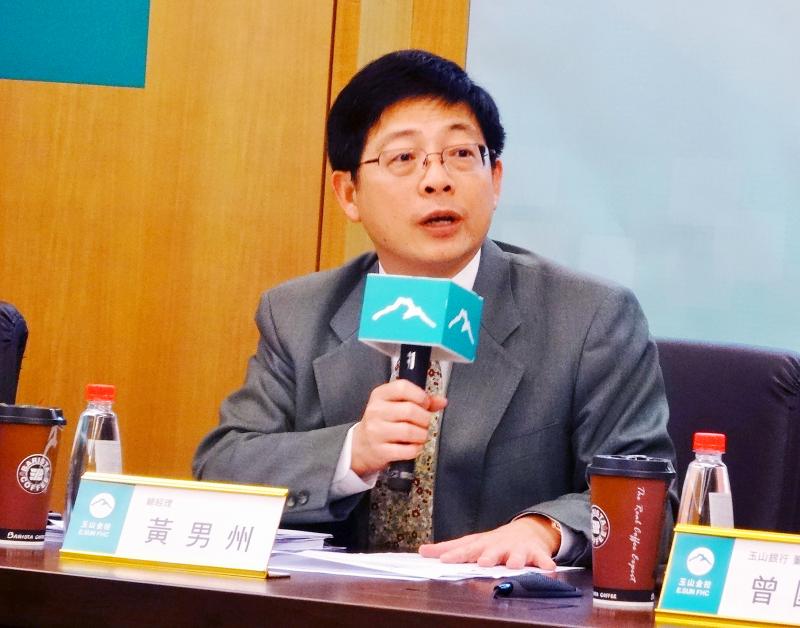E.Sun Financial Holding Co (玉山金控) aims to double its assets to NT$6 trillion (US$215.12 billion) in the next decade and hopes to boost its financial metrics via digitalization, the company told an investors’ conference in Taipei yesterday.
Its flagship unit, E.Sun Commercial Bank (玉山銀行), launched in 1992, took 18 years to acquire NT$1 trillion of assets, seven years to reach NT$2 trillion and another three-and-a-half years to hit NT$3 trillion, E.Sun Commercial Bank chairman Joseph Huang (黃男州) said.
“It seems that the pace [of asset accumulation] is faster,” Huang said. “We hope to add another NT$3 trillion in assets in the next decade.”

Photo: Kelson Wang, Taipei Times
The bank would enlarge its assets mainly through organic growth, but it would also look for good targets for mergers and acquisitions (M&A), he said.
While E.Sun Financial’s M&A targets have focused on banks, such as Kaohsiung Business Bank (高雄企銀) and Cambodia-based Union Commercial Bank PLC, with its increased capital, it would now seek opportunities in the securities and insurance sectors, he said.
E.Sun Commercial Bank is evaluating the policies of Web-only insurance firms, but has not made a decision to invest in them, Huang said.
The Financial Supervisory Commission (FSC) in December last year said that it would allow companies to set up Web-based life or property insurance entities, but they must present an innovative and viable business model.
E.Sun Financial, which is to celebrate its 30th anniversary this year, has set several goals for the next decade, including lifting its return on equity to 12 percent annually on average from 11 percent, raising the ratio of profit at overseas branches to 30 percent from 20 percent and increasing the ratio of net fee income to net revenue to 40 percent from 36 percent, Huang said.
E.Sun Financial also aims to reduce its cost-to-income ratio to 50 percent from 58 percent, counting on digitalization to help reduce administrative costs and boost efficiency, he said.
E.Sun Securities Co (玉山證券) has deployed artificial intelligence to help review account applications and quotas for margin trading, cutting the process to five minutes from 50, the parent company said.
E.Sun Financial has an upbeat outlook for this year in light of potential interest rate hikes, recovering private consumption and strong lending momentum, Huang said.
Credit card consumption fell 14.6 percent year-on-year to NT$455 billion last year due to withering private consumption, but it expects the segment to regain momentum and reach NT$500 billion this year, Huang said.
Rate hikes would help banks garner more net interest income, which accounts for about 45 percent of E.Sun Bank’s total net revenue, while the bank also expects an 8 percent annual rise in lending, he said.

Intel Corp chief executive officer Lip-Bu Tan (陳立武) is expected to meet with Taiwanese suppliers next month in conjunction with the opening of the Computex Taipei trade show, supply chain sources said on Monday. The visit, the first for Tan to Taiwan since assuming his new post last month, would be aimed at enhancing Intel’s ties with suppliers in Taiwan as he attempts to help turn around the struggling US chipmaker, the sources said. Tan is to hold a banquet to celebrate Intel’s 40-year presence in Taiwan before Computex opens on May 20 and invite dozens of Taiwanese suppliers to exchange views

Application-specific integrated circuit designer Faraday Technology Corp (智原) yesterday said that although revenue this quarter would decline 30 percent from last quarter, it retained its full-year forecast of revenue growth of 100 percent. The company attributed the quarterly drop to a slowdown in customers’ production of chips using Faraday’s advanced packaging technology. The company is still confident about its revenue growth this year, given its strong “design-win” — or the projects it won to help customers design their chips, Faraday president Steve Wang (王國雍) told an online earnings conference. “The design-win this year is better than we expected. We believe we will win

Chizuko Kimura has become the first female sushi chef in the world to win a Michelin star, fulfilling a promise she made to her dying husband to continue his legacy. The 54-year-old Japanese chef regained the Michelin star her late husband, Shunei Kimura, won three years ago for their Sushi Shunei restaurant in Paris. For Shunei Kimura, the star was a dream come true. However, the joy was short-lived. He died from cancer just three months later in June 2022. He was 65. The following year, the restaurant in the heart of Montmartre lost its star rating. Chizuko Kimura insisted that the new star is still down

While China’s leaders use their economic and political might to fight US President Donald Trump’s trade war “to the end,” its army of social media soldiers are embarking on a more humorous campaign online. Trump’s tariff blitz has seen Washington and Beijing impose eye-watering duties on imports from the other, fanning a standoff between the economic superpowers that has sparked global recession fears and sent markets into a tailspin. Trump says his policy is a response to years of being “ripped off” by other countries and aims to bring manufacturing to the US, forcing companies to employ US workers. However, China’s online warriors